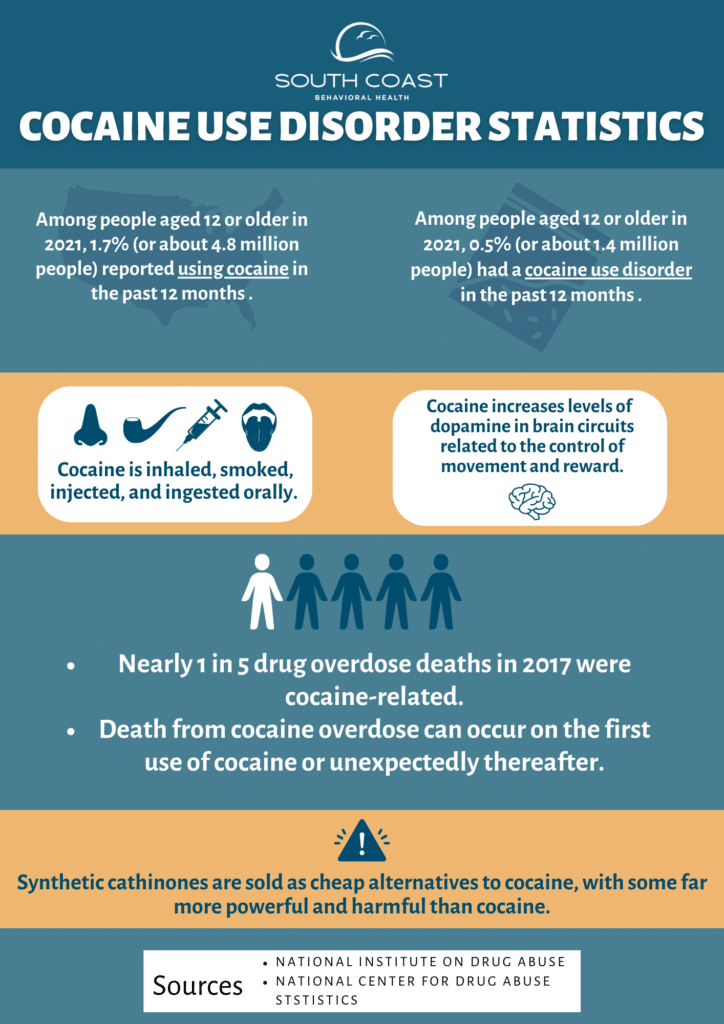Cocaine Addiction
While many people view cocaine as a fun party drug, continuous abuse can lead to both a psychological and physical dependence on the addictive substance.
As with all forms of drug addiction, those who are addicted to cocaine can experience a wide range of detrimental consequences that damage their health, relationships, and overall well-being.
Understanding the nature of cocaine addiction is crucial for recognizing the signs, seeking treatment, and supporting those in need on their path to recovery.

What Is Cocaine Addiction?
Cocaine addiction, also known as cocaine use disorder, is a serious and pervasive issue characterized by the compulsive and harmful use of cocaine. Cocaine is a potent stimulant drug derived from the coca plant, and it is known for its euphoric and stimulating effects. Stimulant drugs like cocaine have a particularly high risk of addiction and dependence, which can lead to dangerous health effects, including an increased risk of stroke or heart attack.
Why Is Cocaine Addictive?
Known for its euphoric and stimulating effects, this highly addictive drug affects the brain’s central nervous system by triggering an increase in dopamine levels. Dopamine is also known as the “feel-good” hormone which is responsible for cocaine’s ability to flood the body with feelings of pleasure. Cocaine’s rapid and intense effects can enhance alertness, energy, and confidence, which can be enticing for users seeking temporary relief from stress or depression.
However, frequent use can quickly lead to tolerance, meaning a person must take more and more cocaine to achieve the same high. Long-term use of this drug can lead to psychological dependence. This is when a person believes they “need” cocaine to function. This cycle of drug abuse often spirals into a full-blown addiction.
What Are the Signs and Symptoms of Cocaine Addiction?
Cocaine addiction exhibits various signs and symptoms, reflecting its physical and psychological impact. These may include:
Physical Signs of Cocaine Addiction:
- Dilated Pupils: Cocaine use often results in enlarged pupils.
- Nasal Issues: Frequent snorting of cocaine can lead to nasal congestion, nosebleeds, or a perforated septum.
- Weight Loss: Appetite suppression may cause rapid weight loss.
- Hyperactivity: Cocaine users often display excessive energy and restlessness.
- Skin Changes: Irritated or acne-prone skin, stemming from sweating and picking, can be noticeable.
- Cardiovascular Effects: Increased heart rate and blood pressure are common.
Behavioral Signs of Cocaine Addiction:
- Intense Cravings: An overwhelming desire to use cocaine.
- Social Withdrawal: Neglect of relationships and social isolation.
- Financial Problems: Driven by the high cost of cocaine.
- Erratic Behavior: Impulsivity, risk-taking, and unpredictable actions.
- Neglected Responsibilities: Neglect of work, school, or family obligations.
- Mood Swings: Extreme mood fluctuations from euphoria to agitation.
Recognizing the signs of cocaine addiction is crucial for early intervention and seeking professional help to address cocaine addiction’s physical, psychological, and social consequences.
Cocaine Addiction Statistics
Cocaine addiction statistics highlight the severity of the drug impact — millions of Americans are addicted to cocaine. Research on drug abuse and addiction highlights the far-reaching consequences of cocaine on both individuals and society as a whole.
Statistics on cocaine abuse addiction include:
- Nearly 5 million people aged 12 or older in the United States had used cocaine in 2020 (NSDUH).
- Cocaine-related overdose deaths have been on the rise, partly due to the presence of the deadly synthetic opioid fentanyl in cocaine (NCHS).
- Long-term cocaine use can result in severe health consequences, including heart problems, respiratory issues, neurological complications, and mental health disorders (NIDA).
- A significant number of individuals who use cocaine for the first time are young. In 2020, approximately 1.2 million people aged 12 to 17 reported having used cocaine at least once in their lifetime (SAMHSA).
- Cocaine is frequently involved in emergency room visits. In 2019, there were over 189,000 visits to emergency departments in the United States related to cocaine use, often due to adverse reactions, overdose, or injuries sustained while under the influence (DAWN).
- The overall economic cost of cocaine use in the United States, including healthcare expenses, lost productivity, and criminal justice costs, exceeded $120 billion in 2017 (NIDA).
Cocaine addiction is a challenging and potentially life-threatening condition that requires professional treatment and support to break free from its grip and regain control over one’s life.
When Do You Need Cocaine Addiction Treatment?
Seeking cocaine addiction treatment is crucial when the harmful consequences of use impact an individual’s life. It’s time to get help when:
- Loss of Control: If one struggles to limit or quit cocaine use despite wanting to.
- Health Deterioration: Cocaine's physical and mental health effects worsen, causing physical or psychological distress.
- Relationship Strain: Addiction strains relationships, leading to conflicts with loved ones.
- Legal Issues: Involvement in criminal activities related to drug use or arrests.
- Legal Issues: Drug addiction can lead to legal problems, including arrests and criminal charges related to drug possession, theft, or impaired driving. Legal issues can result in fines, probation, or incarceration.
- Financial Struggles: Escalating costs of acquiring cocaine and financial instability.
- Decline in Responsibilities: Neglecting work, education, or family responsibilities.
- Mood Swings: Frequent mood swings, anxiety, depression, or paranoia.
Cocaine addiction can lead to severe health problems, legal trouble, financial ruin, and damaged relationships. Seeking treatment at the first signs of addiction is crucial to mitigate these consequences and work towards recovery.
What Is Cocaine Addiction Treatment Like?
Cocaine addiction treatment is a comprehensive process aimed at helping individuals break free from the grip of addiction. While every person enters treatment with a unique set of needs and goals for treatment, cocaine addiction treatment typically entails:
- Thorough assessments and evaluations: Treatment begins with a thorough assessment by healthcare professionals to determine the extent of cocaine addiction and any co-occurring mental health issues. This evaluation forms the basis of a personalized treatment plan.
- Detoxification (Detox): For individuals physically dependent on cocaine, medically supervised detox may be required. Detox helps individuals safely manage withdrawal symptoms, although cocaine detox primarily focuses on psychological withdrawal rather than physical symptoms.
- Medically Assisted Treatment (MAT): Unlike opioids, cocaine doesn’t have specific medications for addiction treatment. However, some medications may help manage certain symptoms, such as depression or anxiety, that can arise during recovery.
- Psychotherapies: Evidence-based psychotherapies, like Cognitive-Behavioral Therapy (CBT), are commonly used to address the psychological aspects of addiction. Contingency management, which rewards abstinence, is also effective.
- Holistic Programs: Treatment often integrates holistic approaches like mindfulness, yoga, and nutritional counseling to promote overall well-being and address the mind-body connection in recovery.
- Dual Diagnosis Treatment: Many individuals with cocaine addiction have co-occurring mental health disorders, such as depression or anxiety. Dual diagnosis treatment addresses both conditions simultaneously, recognizing their interplay.
- Aftercare and Relapse Prevention: After completing primary treatment, individuals receive aftercare plans, which may include ongoing counseling, support groups, and relapse prevention strategies to maintain sobriety.
Cocaine addiction treatment is a multifaceted process tailored to individual needs, with a focus on long-term recovery and equipping individuals with the tools necessary for a healthier, substance-free life.
How Long Is Cocaine Addiction Treatment?
Cocaine addiction treatment duration varies depending on individual needs and the severity of addiction. Recovery is a unique journey, and there isn’t a one-size-fits-all timeline. However, it typically follows these stages:
- Cocaine Detox: This phase typically lasts a week or less, focusing on managing acute withdrawal symptoms.
- Inpatient/Residential Treatment: Programs range from 28 days to several months, providing intensive therapy and support.
- Outpatient Programs: These may last for several months to a year, offering a less intensive but ongoing treatment approach.
- Aftercare and Maintenance: Sobriety is a lifelong commitment that requires ongoing attention. Aftercare includes regular counseling, support groups, and relapse prevention strategies.
Cocaine addiction treatment centers play a crucial role in helping individuals create relapse prevention plans tailored to their unique triggers and challenges. These plans empower individuals to navigate potential pitfalls and maintain their commitment to sobriety, emphasizing that recovery is a lifelong journey deserving of continual support and attention.
Cocaine Addiction Treatment at South Coast Behavioral Health
South Coast Behavioral Health (SCBH) is dedicated to providing comprehensive and individualized cocaine addiction treatment to help individuals overcome their dependence on this powerful stimulant. SCBH’s approach is founded on evidence-based practices and a commitment to addressing each client’s unique needs. Here’s an overview of their treatment approach:
- Assessment and Individualized Plans: SCBH begins with a thorough assessment, enabling the development of personalized treatment plans tailored to each individual’s challenges and goals.
- Medically Supervised Detox: For those physically dependent on cocaine, SCBH offers medically supervised detoxification to ensure a safe and comfortable withdrawal process.
- Levels of Care: SCBH provides a continuum of care, including inpatient/residential treatment, partial hospitalization programs (PHP), intensive outpatient programs (IOP), and outpatient counseling. These levels of care allow clients to transition seamlessly through different stages of treatment as their needs evolve.
- Evidence-Based Therapies: Clients benefit from evidence-based psychotherapies such as Cognitive-Behavioral Therapy (CBT), Motivational Enhancement Therapy (MET), and contingency management to address the psychological aspects of addiction.
- Holistic Approach: SCBH integrates holistic approaches such as mindfulness, yoga, and nutritional counseling to promote overall well-being and address the mind-body connection in recovery.
- Dual Diagnosis Treatment: SCBH specializes in addressing co-occurring mental health disorders alongside addiction, recognizing the complex interplay between the two.
- Aftercare and Relapse Prevention: After completing treatment, SCBH provides clients with aftercare plans, ongoing support, and relapse prevention strategies to help maintain long-term sobriety.
SCBH’s commitment to client-centered care, evidence-based practices, and holistic approaches fosters an environment conducive to healing and recovery. It empowers individuals to achieve lasting freedom from cocaine addiction and regain control over their lives. Contact us today to begin your recovery journey.
Get A Confidential Assessment From A Recovery Specialist
Cocaine Addiction Treatment in Orange County, CA
At South Coast Behavioral Health, our commitment is to help individuals struggling with drug addiction achieve lasting sobriety and improved overall well-being. We provide the tools, support, and guidance needed to navigate the journey to recovery successfully.
We provide cocaine addiction treatment for men within our medical detox and residential treatment centers in Irvine, CA.
We offer cocaine addiction treatment for women at our medical detox and residential treatment centers in Huntington Beach, CA.
We provide cocaine addiction treatment for men within our residential inpatient facility in Costa Mesa, CA.
We provide cocaine addiction treatment during our PHP and IOP programs in Newport Beach, CA.
If you or a loved one is in need of treatment for a cocaine addiction issue, SCBH offers a variety of treatment options to meet your needs, preferences, and goals for recovery. Contact us today by calling 866-881-1184 to start the road to recovery.



